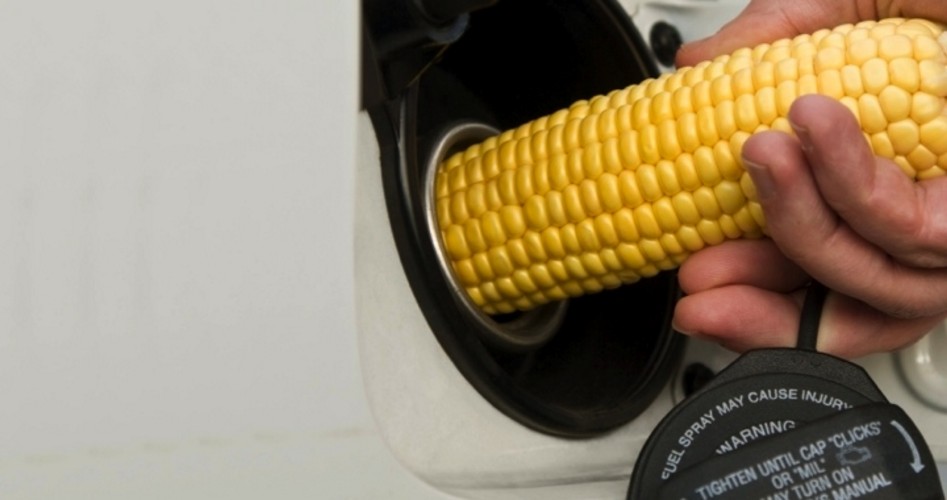
Researchers at the University of Wisconsin-Madison (not exactly a conservative institution) claim they’ve confirmed that corn ethanol is not a good biofuel solution.
More on that coming, but first, some backstory.

In March of 2006 when I worked for then-state Senator Mary Lazich (R-New Berlin) I helped her (above) write the following:
One of the most important votes in the just-completed legislative session was the vote to kill Assembly Bill 15, the ethanol mandate. When the bill came up for floor debate in the state Senate on the final day of the session, I made a successful motion to indefinitely postpone or kill the legislation.
The bill was an outright mandate. It would have forced the state to sell regular gasoline that contained 10 percent ethanol. The government should not be imposing this requirement. Legislators should not be interfering with the lives of constituents by deciding the type of fuel constituents should be required to put in their gas tanks. A purchasing decision is best left for the market and not one that should be forced upon consumers by lawmakers in Madison.
Ethanol would not be of great benefit. There is strong evidence that ethanol costs more, harms the environment and reduces gas mileage. Owners of small engines have made it clear that gasoline containing ethanol wreaks havoc.
If ethanol is so terrific and such a great bargain, then consumers and not the government would drive demand. If there is a groundswell of support among consumers clamoring for this product, I certainly have not heard it. The death of the ethanol mandate bill is a huge victory for consumers.
Lazich hated ethanol. She even published another column about the harmful effect the corn-based fuel had on the price of food.
According to a 2020 document from the WI Department of Agriculture, Trade and Consumer Protection, “The EPA defines E15 as a blend of gasoline that contains greater than 10% ethanol, and up to 15% ethanol. Under current Wisconsin law, E15 must be sold as an alternative fuel, and cannot be labeled as gasoline. The State of Wisconsin requires that gas stations either provide a separate fueling nozzle and hose that dispenses only ethanol-blended motor fuels of 10 percent or less ethanol by volume, or, if one nozzle is being used to dispense both E15 and an ethanol-blended motor fuel of 10 percent or less, that dispenser must bear a label clearly warning any customer that a minimum purchase of four gallons is required. This four gallon minimum purchase requirement prevents a detectable amount of ethanol from being dispensed with your no-ethanol product purchase.”
Last May columnist Thomas wrote:
Following the Energy Independence and Security Act of 2007, ethanol was mandated to be blended in gasoline as a source of “renewable” fuel, under the guise of combating pollution and ostensibly to secure energy independence. In practice, ethanol has done little to rein in pollution and nothing to bring about energy independence. Instead, that has been achieved thanks to technological developments in the fossil fuel industry, such as fracking. Ethanol, meanwhile, is arguably the nation’s biggest boondoggle.
Besides serving as a plague on older gasoline engines (especially lawn equipment), ethanol has resulted in increasing the cost of food as well as raising prices at the pump.
Back to the UW.
On Monday the university released an article about their ethanol research that reads in part:
The carbon emissions from using land to grow corn can negate or even reverse any climate advantages of corn ethanol relative to gasoline. The results confirm what many scientists already realized: From a climate and environmental standpoint, corn ethanol is not a good biofuel solution. Instead, the findings align with the movement in bioenergy research toward developing next-generation biofuels, such as those made from perennial, non-food plants grown on land less suited for conventional agriculture.
“It basically reaffirms what many suspected, that corn ethanol is not a climate-friendly fuel and we need to accelerate the shift toward better renewable fuels, as well as make improvements in efficiency and electrification,” says lead study author Tyler Lark, a scientist in the Great Lakes Bioenergy Research Center and the Nelson Institute for Environmental Studies at UW–Madison.
You can read the entire UW article here:
Should corn ethanol be left in the rearview mirror?
If you’re prior military, this pun sums it up: We’ve Been Corn-a-Holed!
Thank Sen. Chuck Grassley.
LikeLike
Pingback: UPDATE: Remember ethanol? | This Just In… From Franklin, WI
Pingback: UPDATE: Gov. Evers wants to put more garbage (ethanol) in your gas tank | This Just In… From Franklin, WI